Content Management System or Static Site: Which Is Best?
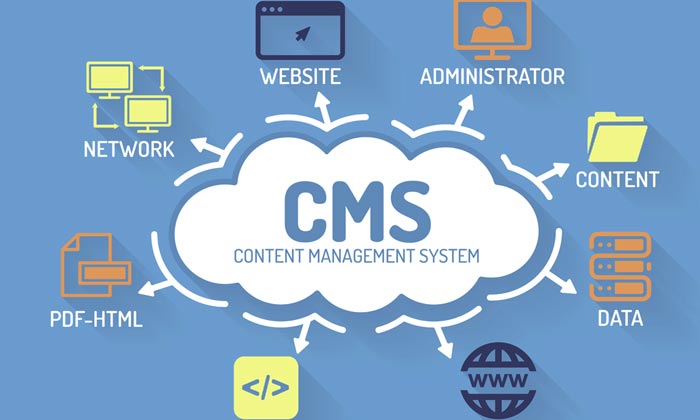
Asking whether a content management system (CMS) is better than a static site is a bit like asking whether boots or shoes are the better footwear. The answer is very much dependant on what they are being used for and what the user wishes to do. With footwear, obviously boots are better for hiking, but sandals are better for walking on the beach. When applied to building a website there are circumstances where a CMS is more appropriate and others when a static site would be the best option.
The first difference is the actual building of the website in the first place and how it is done. A static site needs to be designed and coded from the outset, therefore unless the website owner has programming and design skills, this work will need to be contracted out. The programmer you hire will need to have a comprehensive knowledge of HTML and must be happy and willing to work in conjunction with the designer to ensure the functioning and the look of the finished site meets your specifications.
WordPress Websites: The Latest and Best Solutions for SEOs
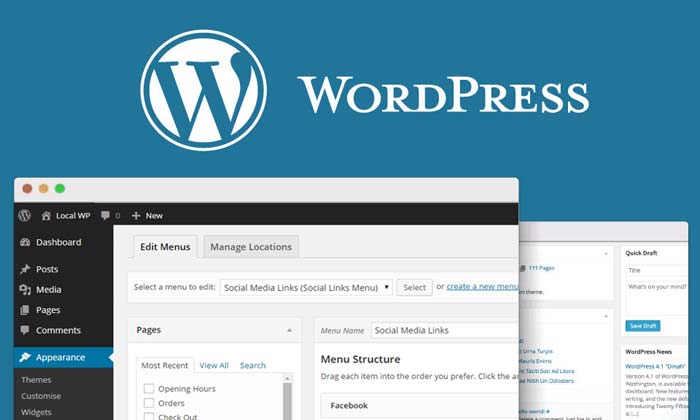
WordPress is an online, open source site creation instrument written in PHP. Web designers, free-lancers and at-home-tinkerers all love it which is the reason it is the most popular CMS in the World today. However, in the non-nerd talk, it’s likely the simplest and most effective blogging and site Content Management System (CMS) in presence today.
The Benefits of Using WordPress
The Programming is Free
How often have you been given something for free that is completely utilitarian and ready to use? With this free Content Management System (CMS), if you need to upscale your website a little more with premium topics or new modules, you will save a great deal over what you would have paid for a professionally made website.
WordPress has a Web Search Tool (SEO) Points of Interest
Web search engines love websites that are easy to list like WordPress is says the guys at SEO Sydney Pro, and that have regularly overhauled content. That is where blogging comes into play. Just by maintaining your business or individual site and writing your blogs in a way that is characteristic of you, you’ll be delivering the kind of crisp, applicable content the search engines will love. You need visitors to discover your site, so you have to ensure it can be found.
The best way to do that is to concentrate on SEO. SEO is the procedure of making the kind of changes and adding conformity to your site that search engines like so they’ll rank your website higher.
Appearing higher in indexed lists means more visitors will discover your site. There are some basic methodologies that can help your SEO. Having more substance gives web crawlers more items to rank, which in turn helps a prospective client to find your website. It also implies you have more important substance in your information so individuals will find the information they are looking for and become customers. Utilizing WordPress is a great approach to enhance your SEO more easily
5 Ways to Generate Revenue Through Drupal

Drupal is a free software package used as a content management system which can be improved by installing modules and by personalized modification. It functions as a publishing platform for different industries to run an online store. Utilizing its e-commerce feature has helped many organizations generate more income in the past decade.
It is well-designed, renowned, and flexible. Drupal consists of an extensive collection of elements that are considered to be extremely important for the purpose of generating profits by webmasters, administrators, and marketing experts.
Here are five easy ways through which you can generate revenue using Drupal:
E-commerce
E-commerce is the demand of the information age we are living in. Drupal E-commerce mainly consists of small modules which simplify the task of setting up a shopping cart, reviewing product and using checkout pages. Furthermore, it also manages balances, taxes and discounts, and facilitates in the organization of inventory and lists of products.
This feature provides you with detailed reports, history of orders, and reviews. Even with all these added benefits, Drupal E-commerce is free of cost, unlike its other competitors. It guarantees a picture perfect e-commerce experience for both customers and users alike.
How to Keep the Costs of Your Website Down
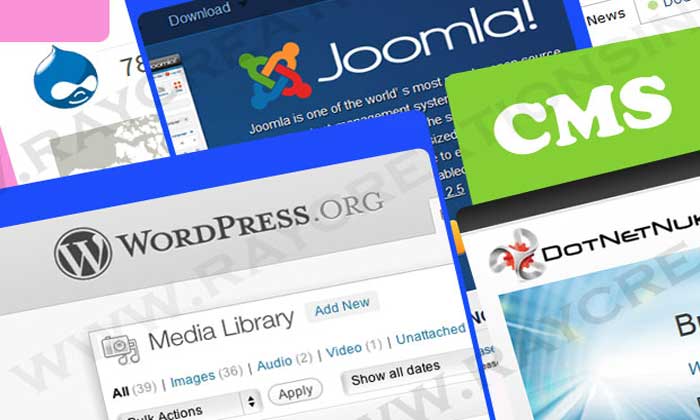
If you are new to building websites you may not realise you don’t have to go with the Content Management System (CMS) your web hosting company promotes. In fact, many offer the option of installing others, often free, CMS that is easier to use and needs much less of a learning curve than others. For instance, you can usually install WordPress, which is one of the simplest and easiest to use.
You might want to have your digital agency set it up for you so you don’t have to worry whether it is done correctly in the first instance. But then you would want the convenience of being able to make simple changes or additions yourself, rather than having to contact them to do it – and have to pay extra each time.
It is really easy to add posts or pages to a WordPress site once it is up and running with everything on it that you need. You simply go into your administration area and click on Page or Post, then copy and paste what you have typed into the page that appears. Or you can type it directly onto the page because it works just like Word on your computer. This is what is called a “what you see is what you get” or “WYSIWYG” editor.
It’s important to make sure you’re only putting quality content online, because your website affects your SEO results, ask yourself – is your website harming your SEO? making sure your content is SEO ready can keep your costs down in the long term.
You don’t need to know even simple code, because WordPress does all that for you on another page. You can click a link to view it if you want to, but there’s no need.
Websites Made Easy
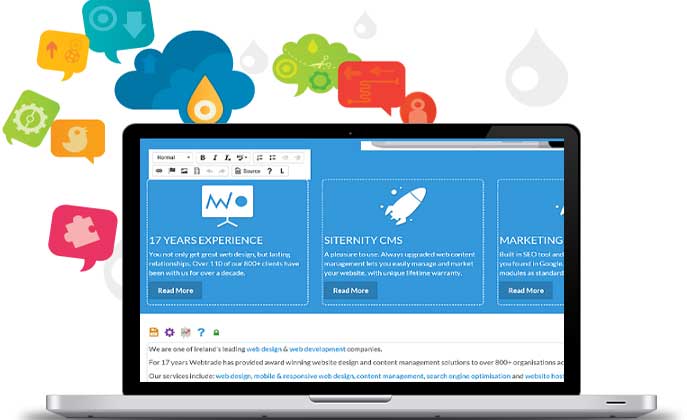
If you have had anything much to do with websites, you’ll know that it is possible to create something as simple as a blog with no knowledge of HTML. But when it comes to a business website or an online store, it’s not quite as simple. A website designer is the best one to create such a website, but you’ll still need to be able to change things or add more product in the days and years to come.
Rather than depending on the web designer to make small changes, it is far better to use a content management system (CMS) that you can understand; one that does not require any steep learning curve or knowledge of HTML. This is possible by using certain software that has been offered up by the many creators for free. It allows anyone to get into the ‘back-end’ of their website, through an admin link, where they can easily remove outdated content and add new, be that images or text.
Such software has its own editor and is as easy to use as your computer, since it has all the same functions in the same order, or at least along the top where they are easy to see and use. For instance, if you want to bold or italicise words you only have to highlight them and click on B or I up the top, just like on your computer. You can also add bullet points, change the font size or style and add colours to the text, just like you can in Word.
eCommerce Essentials to Consider

It is an exciting time to set up your very own ecommerce store. Few people have the time or expertise to do this on their own, so don’t be afraid to bring in expert help. While it will cost you, it will save time and a steep learning curve. Besides that, professional help will ensure your new online business store looks professional and works properly.
When dealing with the public on a commercial basis there are several things to put in place on your website to protect you and to help gain trust so your visitors will become customers. It’s important to be transparent and part of this is to have all your policies clearly explained and in a place where they can be found easily.
Policies include a returns policy so customers can be assured that if the goods are not right for them or are damaged, they won’t lose money over the deal. You also need to have terms of use and have it linked to a tick box to ensure they have read and understood all about it before they buy. Clauses in this will be about liability to protect you from litigation.
Why Joomla is Trusted by Millions of Websites

The reason Joomla CMS is trusted by literally millions of websites online, is because it is one of the very few that can be used to create, edit, publish and manage content. This is why it is considered a good alternative to employing a full time web design professional. The following are some of the main reasons it is so trusted:
Easy and fast editing – If you are not using a CMS and want to make some edits on the pages of your website, Joomla has your back. Using another CMS may not ensure data integrity the way Joomla can. It does this by locking the content so that no one is able to access or make changes to a document that is being edited apart from the approved person. Since the software uses powerful editors to make changes, the person editing a document will have no trouble making adjustments. In fact, a simple document will seem just like a Word file when it is being changed.
Customizable Core – Even though Joomla’s core is called hackable, that is not a cause for concern. It just means that it can be customized by anyone who has a modicum of knowledge regarding PHP. That’s because this open source software is very clean and quite well documented. It is ‘hackable’ so adjustments can be made to optimize it for a specific reason.
Up the Ante on your Blogs with WordPress Plug-ins
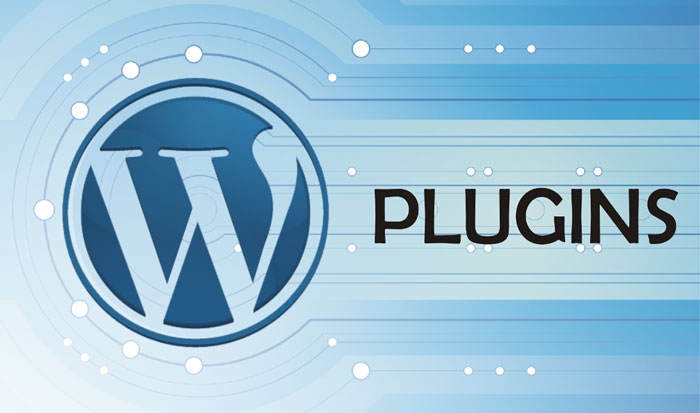
Even if you consider yourself a WordPress guru, you will only go so far unless you install appropriate WordPress plug-ins to fulfill all of your needs. The following are some that are preferred by the CMS community, but whatever you do, don’t try and install all of them. Pick those that seem relevant if you don’t want your website to slow down.
W3 Total Cache
WordPress can be great if you have a lot of content to share, but it can get slow fast if it is not managed with plug-ins or is hit with loads of traffic every day. For instance, once your website hits 500 page views, you will need to start caching them. That way they won’t need to be re-generated each time. You can do that easily with W3 Total Cache. The plug-in is affectionately known as The Swiss Army knife of performance plug-ins since it can manage almost everything from delivery to miniaturization.
CloudFlare
If you are looking for a solution that can fix loading speeds, then you should download CloudFlare. This is a free to use plug-in that can act as a replacement for your current DNS, work as a firewall against malicious requests and can even cache content. Since you will need to modify your domain for it, you may face a little difficulty during installation. However, it will be smooth sailing once you do.
Difference between Plug-ins and Modules
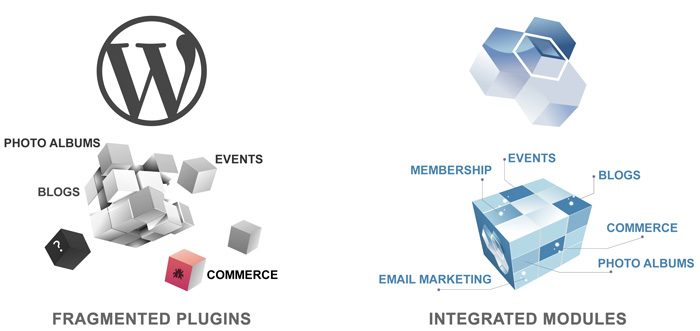
If you are new to Joomla, then you need to know the difference between modules and plug-ins. These may seem similar to the untrained eye, but they are as different as night and day. Let’s take a look at each in detail.
What are Modules?
Modules are basically flexible extensions in Joomla that are used to render pages. Also known as boxes, these are arranged around the components of each page such as the log-in module. Each one is assigned to a menu item so you can use them to hide a module according to the page you are currently on and some are assigned specific components. For instance a ‘latest news’ module will be linked to com_content and will also sport links to the latest content pieces. On the other hand, you do not have to link modules to components or anything for that matter. They can be used as static HTML or text.
Why You Should Use Drupal for a CMS Website

From personal website to community portals, Drupal has been helping site owners make an impact online ever since it was launched. Offering more than 2,000 themes and design options as well as 20,000 modules, it’s loved by both owners and developers alike. In fact, it serves as the back-end infrastructure for several notable custom websites on the World Wide Web today.
Besides the above mentioned, the following are some of the main reasons why this CMS platform is making waves in its industry:
Highly Customizable – With its vast number of themes, designs, layouts and ease of operation, Drupal designers and web developers have a smorgasbord of choices when it comes to creating custom websites. This includes addressing complex client requirements.
Allows Rapid Deployment – Regardless of complexity, this CMS allows business owners and companies to launch functionalities and core features easily and quickly. Using Drupal, developers can also make changes to their creations even after deployment, which is critical post feedback and when making tweaks according to business requirements.